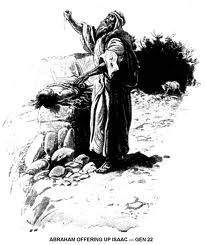 In what follows, you will read an “academic paper” in which I explore some elements of open theism. This is a view of God’s foreknowledge that is controversial, but still in the evangelical family of belief. The most well known Christian leader who holds to this view is Greg Boyd. This will be a nine part series.
In what follows, you will read an “academic paper” in which I explore some elements of open theism. This is a view of God’s foreknowledge that is controversial, but still in the evangelical family of belief. The most well known Christian leader who holds to this view is Greg Boyd. This will be a nine part series.
—————————————————————–
A story in the Bible continues to endure scrutiny for its seemingly horrific command from God to kill a father’s son. Some readers traditionally designate this narrative as “the sacrifice of Isaac.” This seems a bit odd in light that Isaac at no moment is sacrificed and does not himself make a personal sacrifice in this chapter. If this son is to make his way into the title perhaps the label of “the binding of Isaac” appropriately describes the scene. Jewish commentators apply that title to this scene in Genesis 22.[1]
Another way to think about the story in light of the unnamed actor (thus far) invites the heading of “the testing of Abraham.” Certainly Abraham takes a journey toward Moriah’s peak as a test from the Lord. Will he act faithfully to the paradoxical command of God to kill his only son? This is not just any child, but the son of promise through whom a great nation’s birth and eventual mission depends! No test in human history compares to the cognitive dissonance between promise and pathway portrayed in this text. We could as easily call this passage of Scripture the “binding of Abraham,” for he truly finds himself in a bind. Will he follow the command of God out of obedience or will he be a loving father who would never put his hand (or a knife for that matter) on his own flesh and blood? There seems to be no way out.
There may yet be another title header for this textual unit that could put the main theme into clearer focus. Perhaps instead of thinking about this story as Isaac or Abraham being bound, we ought to bring the third major character into the story, namely God. Clearly Isaac is the potential victim, Abraham is the tested potential perpetrator, and God is the director of it all. Why would God be willing to do such a thing that on the surface seems like a cruel self-indulgent game? If this were the case, the character of the Creator would be rendered inconsistent with loving-kindness. Could it be that God himself suffers from the lot of being bound? In other words, as difficult as it is to imagine the tension that Abraham experienced between obedience and promise, maybe God’s anxiety is far worse. I want to suggest that the most appropriate title for this story is “the binding of God” for it is he who finds himself in a greater bind than the patriarch and the child.
In what follows, we will explore the theological interpretative issues presented in Genesis 22 as a test case for God’s foreknowledge. As we do so, a close reading of the passage will challenge many assumptions associated with this story in particular and with God by extension. Over against Hellenistic philosophical categories for the divine, the Hebrew Scriptures portray God as vulnerable, relational, flexible, and as a tester, who faces a partially open future. This distinction will be demonstrated by the chapter of Scripture at hand and will be verified through theological analysis.
Genesis 22 as a Test Case for the Openness of God
“The binding of God” serves as the suggested heading for the story involving Abraham and his instruction to sacrifice Isaac. This title suggests that God finds himself in a bind in the story. From the beginning I want to clarify that this bind will be shown to be by God’s own doing, in that through granting humanity free will, he has chosen to limit what he knows about how his creatures will exorcize such. This is a sovereign God who chooses to become vulnerable by working within history to redeem creation by partnering with fallen humanity. Abraham represents the origins of Israel, who God called to bless the nations (Genesis 12) by reflecting the original design of shalom. In our test case text for God’s openness, God has bound himself and needs to discern if Abraham is the right person to carry salvation history forward. In order to discuss the exact nature of this bind, we need to explore the biblical contours of this seemingly archaic text.
[1]. Ellen F. Davis, Getting Involved with God: Rediscovering the Old Testament (Cambridge, Mass.: Cowley Publications, 2001), 64.











